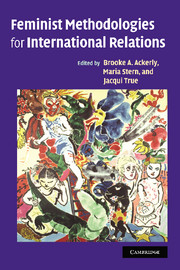Book contents
- Frontmatter
- Contents
- Notes on the contributors
- Acknowledgments
- 1 Feminist methodologies for International Relations
- Part I Methodological conversations between feminist and non-feminist IR
- Part II Methods for feminist International Relations
- Part III Methodologies for feminist International Relations
- Conclusion
- Bibliography
- Index
Part II - Methods for feminist International Relations
Published online by Cambridge University Press: 12 January 2010
- Frontmatter
- Contents
- Notes on the contributors
- Acknowledgments
- 1 Feminist methodologies for International Relations
- Part I Methodological conversations between feminist and non-feminist IR
- Part II Methods for feminist International Relations
- Part III Methodologies for feminist International Relations
- Conclusion
- Bibliography
- Index
Summary
In the first part we followed three different explorations into the question of feminist methodology in the field of IR. Building upon this conversation, each author of Part II presents her methodological dilemmas, decision-making processes, and research methods. In this second part, the organizing focus on ‘security’ enables us to illustrate just how broadly feminists interrogate even one IR concept, and some of the many feminist approaches they have developed for doing so. These approaches are not limited to applications in the area of security studies, but instead offer possible ways of designing and conducting a broad range of feminist studies of global politics. To explore questions of security in sites familiar and unfamiliar to IR disciplinary norms of inquiry, chapters use a variety of research methods, including oral history, ethnography, interviews, archival research, participant observation, and discourse analysis, in the service of different theoretical and epistemological approaches. Centrally, the contributors identify the limitations they faced in posing their feminist research questions within the theoretical frameworks demarcated by IR.
- Type
- Chapter
- Information
- Feminist Methodologies for International Relations , pp. 89 - 90Publisher: Cambridge University PressPrint publication year: 2006



